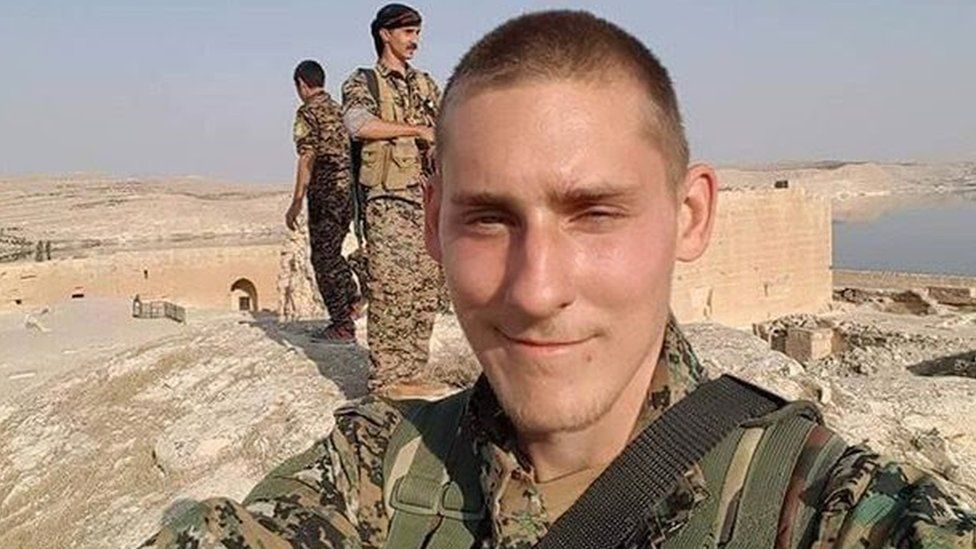Briton Ryan Lock killed fighting Islamic State in Syria
- Published

Ryan Lock's family described him as a "caring and loving boy"
A British man has been killed fighting so-called Islamic State in Syria, Kurdish activists have told the BBC.
Ryan Lock, 20, from Chichester, West Sussex, travelled to join Kurdish forces known as the YPG in August.
His family said Mr Lock, a chef who had no military experience, was a "very caring and loving boy".
In a letter seen by the BBC, the YPG said he was killed on 21 December in Jaeber village in the battle for the Syrian city of Raqqa.
The letter offered condolences to the family of Mr Lock, who went to school in Hampshire, saying his loss had "affected us deeply ".
It said Mr Lock - who was given the Kurdish name Berxwedan Givara - joined the YPG on 4 September and had "participated actively" in the conflict in Syria.
"Ryan was not only a fighter providing additional force to our struggle. In fact, with his experience and knowledge he has been an example for younger fighters," it said.
He was killed alongside four other YPG fighters during an offensive launched by the Kurdish force, the letter, which was dated 23 December, added.
It said Mr Lock's family had lost "their beloved son" and "we the YPG lost our daring and courageous companion".
The YPG wrote to Mr Lock's family on 23 December
In a statement, his father John Lock said "Ryan was a very caring and loving boy who would do anything to help anyone.
"He had a heart of gold. We ask for privacy to allow our family to grieve."
Mark Campbell, who was part of a group of Kurdish activists who visited Mr Lock's family, said they were "completely and utterly devastated" and "deep in grief".
He said Mr Lock had told his family he was going on holiday in Turkey, but later posted a message on his Facebook account saying he had arrived in Syria to fight IS.
School 'saddened'
He said the family's main concern had been the return of their son's remains to the UK.
"We gave the assurance that the YPG will do everything in their power to make sure their wishes are fulfilled," he said.
"We hope the UK government will also use all their diplomatic powers to give practical assistance to the family to help bring Ryan's remains home for burial."
Mr Campbell said he believed there were currently about "a dozen" Britons fighting IS in Syria, many who travel through Kurdistan and then join the YPG.
Mr Lock attended Warblington School, in Havant, Hampshire, which described him as a "well-liked" pupil.
Julia Vincent, headteacher, said: "We are very sorry and saddened to hear the news about Ryan Lock. He was a well-liked pupil during his time at Warblington School.
"Our thoughts go out to his friends and family at this time."
My fight against IS
Briton Tim Locks travelled to northern Iraq in February 2015 to fight IS.
He said he was able to make contact with the Kurdish YPG using social media and Google.
He told BBC Radio 5live his "trigger point" was watching reports of tens of thousands of Yazidi civilians being driven up and trapped on Mount Sinjar by militants, in 2014.
"I said 'enough's enough, I want to go out there and help in anyway I can'", he said.
Mr Locks, who said he left behind his own construction company, said he had paid for some "very limited" private firearms training before leaving.
He said the YPG did not "just release" people into conflict zones without first putting them through their own training.
Asked about other Britons fighting IS, he said it was "impossible" to say how many were there, adding: "We came across people from all walks of life and a lot of different nationalities out there."
He added: "I hope I helped in some small way in the big cause."
'Deepest sympathy'
The father of the first British man to be killed fighting with the Kurds against IS, Konstandinos Erik Scurfield, also visited Mr Lock's family.
Chris Scurfield said: "We share Ryan's family's sorrow and offer our deepest sympathy."
A Foreign Office spokesman said: "The UK has advised for some time against all travel to Syria.
"Anyone who does travel to these areas, for whatever reason, is putting themselves in danger."
- Published2 August 2016
- Published4 March 2015
- Published15 March 2015